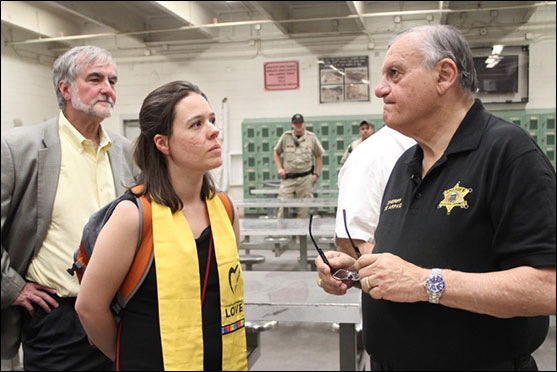
Susan Frederick-Gray v. Joe Arpaio
The Rev. Susan Frederick-Gray joins federal class-action lawsuit against Maricopa County Sheriff Joseph Arpaio.
The lawsuit, filed June 18 in federal court in Phoenix, seeks to stop enforcement of two Arizona laws, passed in 2007 and 2008, that created new categories of identity theft in order to punish undocumented workers. The suit argues that the laws are unconstitutional because immigration enforcement is exclusively a federal function, and because they violate equal protection rights by focusing on undocumented workers. It claims that officials, including county prosecutor Bill Montgomery and Arpaio—who has gained national attention through aggressive arrests of immigrants—target workers but ignore prosecution of employers who break the law by hiring them.
“I joined this case because these Arizona laws are another tool used to tear apart families, to separate children from their parents and grandparents,” says Frederick-Gray, head of the Arizona Immigration Ministry. To change U.S. immigration policy, she adds, “we need to advocate on a national level for an end to the deportations, and we must also work locally to stop the laws that unfairly criminalize undocumented people.”
Frederick-Gray has been at the forefront of working for immigrants’ rights, including being one of twenty-nine UUs arrested in 2010 for protesting another Arizona immigration law, SB 1070. As head of the Arizona Immigration Ministry, she helped organize the UUA’s Justice General Assembly in 2012 in Phoenix, which focused on immigration justice and Arpaio’s tactics, which many consider extremely aggressive. On July 31, 2014, she was among thirty-one UUs arrested in front of the White House during the three-day “Days of Action” organized by an interfaith group to stop mass deportations of immigrants.
Among the most serious potential consequences of the Arizona identity-theft prosecutions, Frederick-Gray says, is that convicted workers will become felons ineligible to benefit from comprehensive reform of U.S. immigration law, if it is passed. It is important for UUs to be involved, she adds, because immigration policy “is fundamentally a moral question: How do we treat workers in this country?”
The lawsuit argues that Maricopa County officials and Arizona legislators deliberately sought to sidestep federal laws they disagreed with by ramping up state identity-theft laws to nab workers using false credentials. It also claims that Maricopa officials refuse to prosecute the vast majority of employers who violate federal law related to hiring undocumented workers.
Federal law places more liability on employers who hire workers illegally, including civil and criminal penalties; it provides no criminal penalties for undocumented workers, the complaint states. Since 2008, the Maricopa County Sheriff’s Office has conducted more than eighty workplace raids and arrested more than 780 workers, including nine on June 13, 2014, according to the complaint. Those found using false Social Security numbers, including two women who are plaintiffs to the lawsuit, are charged with felony identity theft. During that same time frame, the county pursued actions against only four employers, with civil actions against three.
“Our Arizona identity theft laws have been diluted by trying to make them state immigration laws,” says Frederick-Gray, who describes Arpaio’s actions as immoral as well as illegal. “This misdirects resources and may come at the cost of actually tackling the problem of identity theft in Arizona.”
Unlike identity thieves who steal Social Security numbers and other personal information in order to buy things under false pretenses, undocumented workers use fake names and Social Security numbers in order to work, says Frederick-Gray. “People who work under false Social Security numbers pay into our system. They pay taxes. They are paying toward benefits for retired and disabled Americans,” she says.
In addition to Frederick-Gray, the other plaintiffs are two undocumented workers, both of whom pled guilty and served jail time for identity theft, and Puente Arizona, an immigrant-rights organization. The suit asks that the criminal records of the two women—one, a 26-year-old mother of a preschooler, who’d worked fourteen hours a day for six years at a supermarket and ended up serving fifty-nine days in jail—be expunged.
Photograph (above): The Rev. Susan Frederick-Gray and Maricopa County Sheriff Joe Arpaio speak during a delegation of religious leaders to “tent city” on June 24, 2012, as the Rev. Dr. William F. Schulz, president of the UU Service Committee, looks on (© 2012 Dea Brayden/UUA). See sidebar for links to related resources.
Comments powered by Disqus






